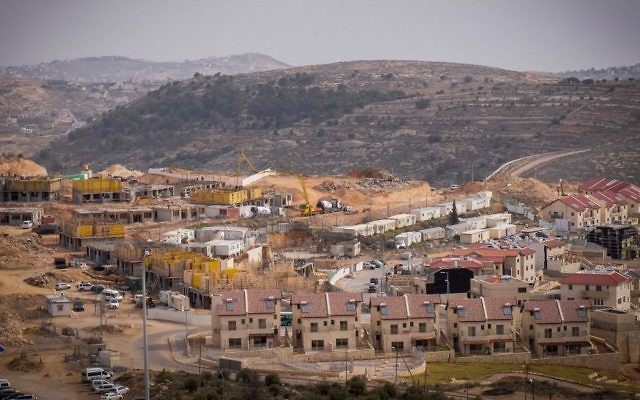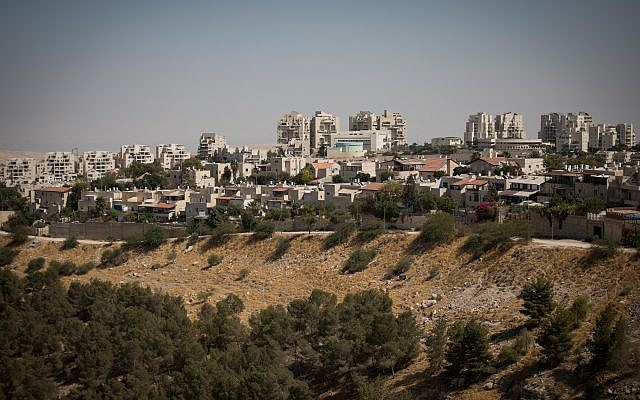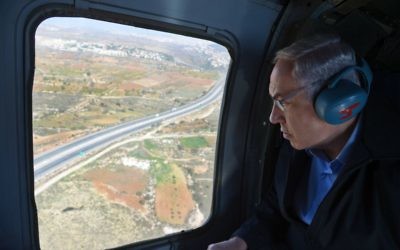Move needs ‘diplomatic preparation,’ official says, indicating Netanyahu wants to discuss gambit with US administration

Prime Minister Benjamin Netanyahu has decided to postpone a vote on a controversial bill that critics say would amount to the de facto annexation of Israeli settlements surrounding Jerusalem, an official said Saturday.
The bill, which would not amount to the extension of Israeli sovereignty to these settlements, had been expected to be voted on by the Ministerial Committee for Legislation on Sunday, in a move that would fast-track its progress through the Knesset.
But the Israeli official said on condition of anonymity that the bill needs “diplomatic preparation,” declining to elaborate further.
“The law also needs diplomatic preparation and thus will be postponed for the moment,” the official said.
The bill would absorb major Israeli settlements currently in the West Bank into nearby Jerusalem by enlarging the city limits.
While Netanyahu has expressed his support for the “Greater Jerusalem” bill, an unnamed source told Israel’s Channel 10 news the coalition would not advance the legislation without first consulting the Trump administration, which has been seeking to restart long-stalled Israeli-Palestinian peace talks.
Although US President Donald Trump has been much less outspoken than his predecessor Barack Obama on the issue of the settlements, the absorption of the West Bank communities into Jerusalem would likely anger the Palestinians and possibly undermine the American leader’s efforts to revive peace talks.
The proposed law would absorb Ma’ale Adumim, Beitar Illit and Efrat, along with the Etzion bloc of settlements, into the Jerusalem municipality, while also removing around 100,000 Palestinians from the city’s census.

Some are fairly deep in the West Bank, more than 10 kilometers (six miles) from Jerusalem. In total, they are currently home to some 130,000 Israelis.
According to the proposal, initiated by Likud MK Yoav Kisch and backed in July by Intelligence Minister Yisrael Katz, residents of those settlements would be able to vote in Jerusalem municipal elections, but the settlements would not be under full Israeli sovereignty.

The move would make Jerusalem’s official demographic balance significantly more Jewish and would “bring back Jerusalem’s status as a symbol,” according to the proposal’s preamble. Residents of the settlements in question would maintain municipal autonomy through independent regional councils. They would vote in four local elections: for Jerusalem mayor, for a Jerusalem municipality council, for the head of their regional council and for members of said council.
Under the same proposal, around 100,000 people living in Palestinian neighborhoods outside the security barrier surrounding the city would be removed from the city’s census, with a new municipality created for them.
Responding to the bill, the Peace Now settlement watchdog called it a “reckless step of a government that seems to be determined to ruin the possibility for a two state solution.”
“If passed, this bill will constitute a de-facto annexation and a clear step towards a de-jure annexation. We cannot let this bill become law!” the NGO concluded.
Israel captured East Jerusalem, the Old City and the West Bank from Jordan in 1967, and extended sovereignty to the Old City and East Jerusalem in 1980 in a move never recognized by the international community.
Most nations also consider the West Bank settlements illegal under international law, as well as the formal annexation of land seized during war. Israel has maintained that the settlements are not illegal, saying that the land is disputed. Israel has controlled the West Bank since capturing it in the 1967 Six Day War, but has never moved to annex any of the territory beyond extending sovereignty to East Jerusalem. It did later apply Israeli law to the Golan Heights, captured from Syria.
Most Israeli leaders maintain that the largest settlement blocs in the West Bank will become part of Israel in any future peace deal.
For the vast majority of the international community, the status of Israel’s settlements, built on land the Palestinians see as part of their future state, is to be decided in peace negotiations.
The bill has drawn harsh criticism from Palestinians and those hoping to salvage the two-state solution.
Israel sees the entire city as its indivisible capital, while the Palestinians want the eastern part as the capital of their future state.
As reported by The Times of Israel
